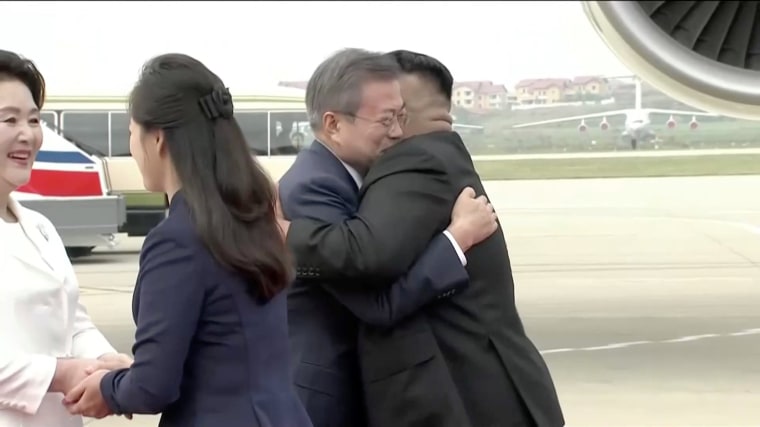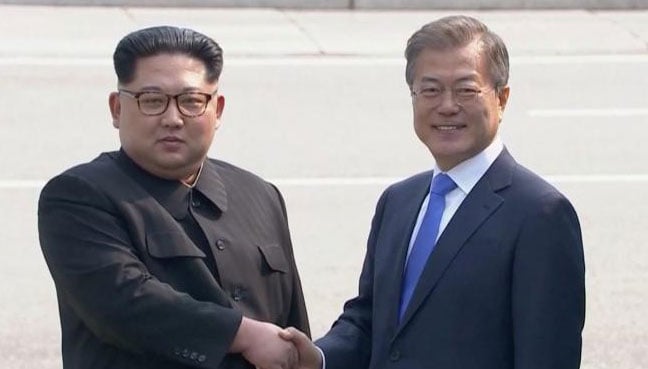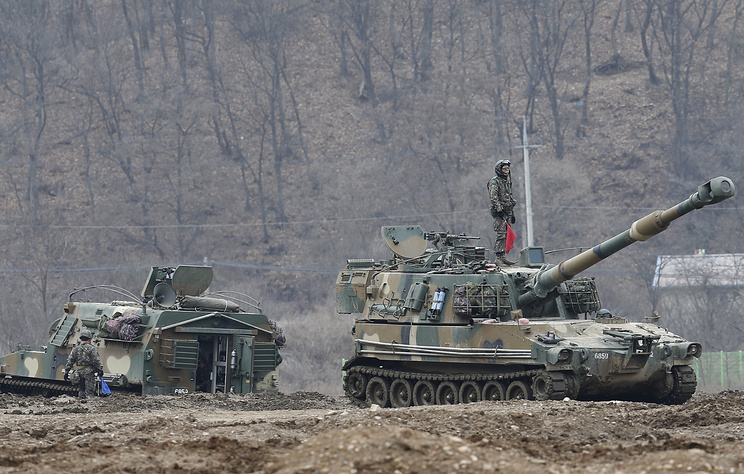angelburst29
The Living Force
12-12-2018 - The Eurasia Future “Person of The Year” is: Kim Jong-un And Moon Jae-in
The Eurasia Future "Person of The Year" is: Kim Jong-un And Moon Jae-in - Eurasia Future

It has become increasingly common for media outlets to name a “person of the year” every December. Such an individual’s achievements should be consistent with that of someone who has positively impacted world events either at a local, regional, national or most commonly, at an international level. This year has been filled with many larger than life individuals doing larger than life things, but on the whole, it is clear that two individuals should share the title of person of the year: Kim Jong-un and Moon Jae-in.
First of all, there is Kim Jong-un. The DPRK (North Korea) leader began 2018 by extending an olive branch of peace to Seoul in his New Year’s message. What has followed has been an unprecedented year of peace, human connectivity and positive political and diplomatic exchange between the artificially divided Korean people. After decades of hostility following the Armistice of 1953 which ended one of the most devastating wars of the modern era, the young Kim Jong-un made the history changing decision to embrace patriotic minded reforms which will help to open the DPRK to new forms of prosperity guided by the power of peace which will simultaneously protect the dignity of the Korean people from far away interference in their national life, all the while safeguarding their unique cultural characteristics.
Throughout the year, Kim Jong-un has had to strike a balance between defending his nation against traditional American intrigue while also looking to open up new diplomatic avenues throughout the world, but most importantly to the South. During his historic meeting with Donald Trump in Singapore, it became clear that the Kim Jong-un era would be one of unexpected surprises – all of which have been deeply positive in so far as they have promote a spirit of peace, optimism, genuine hope and enlightenment.
The man whose leadership was once highly enigmatic has proved himself to be a passionate, dignified and affable diplomat whose tireless engagements with multiple nations including all three superpowers has come to author a new chapter in the pages of pan-Asian history, one which looks to usher in a golden era of Korean peace through prosperity.
But while Kim Jong-un was the first to extend an olive branch to the South, the peace minded, level headed, intelligent and moderate South Korean President Moon Jae-in deserves an equal amount of credit for not just grabbing Kim’s olive branch but for running with it along side his fellow Korean leader. Moon’s rise to power was not an easy one. It has been revealed that in 2012, the far-right Park Geun-hye colluded with the domestic intelligence agencies to rig the Presidential election in her favour. Yet Park’s gross corruption resulted in the largest ever peaceful anti-government demonstrations in Korean history.
Park was eventually impeached and imprisoned which lead to a special election in 2017 which saw the rise of Moon to the Blue House. While Park once wickedly conspired to assassinate the leader of the DPRK, Moon inspired Kim Jong-un to think about building a better and brighter future on a collective and fraternal basis. As Moon ended his predecessor’s policy of hostility towards fellow Koreans, Kim responded in kind and the result has been nothing short of breathtaking.
From North and South Korean soldiers embracing as brothers while laying down their arms in the DMZ (demilitarized zone), to Kim and Moon signing friendship agreements in the Panmunjom peace village and the arrival of a joint Korean team at the Olympic Games and Asian Games – this has been a year of supreme success for the Korean people.
Based on the progress made by Kim and Moon, both Korean states are now standing united in opposition to anti-Pyongyang sanctions while both countries look with optimism to the Belt and Road initiative that can help to economically unify Korea on a people-centred, respectful and rational basis. Seoul’s contribution to a new trans-Korean rail system as well as joint projects in Korea spearheaded by neighbouring China and Russia look to positively transform the future for millions of Koreans. Throughout this process, Kim and Moon have weathered many a storm and confronted many challenges with grace and a superior sense of purpose.
And yet at this time last year, many felt that nuclear war would break out in Korea. With this in mind, it feels as though the adage “what a difference a year makes” could have been specifically authored to describe the difference between Korean politics in 2017 and 2018. Of course, it has been the positive mentality and hard work of both Kim Jong-un and Moon Jae-in that has made the difference.
While 2018 was filed with important events led by important individuals, 2018 was above all, the year when peace prevailed in Korea. This is why Kim Jong-un and Moon Jae-in are the joint winners of Eurasia Future’s “person of the year”.
The Eurasia Future "Person of The Year" is: Kim Jong-un And Moon Jae-in - Eurasia Future

It has become increasingly common for media outlets to name a “person of the year” every December. Such an individual’s achievements should be consistent with that of someone who has positively impacted world events either at a local, regional, national or most commonly, at an international level. This year has been filled with many larger than life individuals doing larger than life things, but on the whole, it is clear that two individuals should share the title of person of the year: Kim Jong-un and Moon Jae-in.
First of all, there is Kim Jong-un. The DPRK (North Korea) leader began 2018 by extending an olive branch of peace to Seoul in his New Year’s message. What has followed has been an unprecedented year of peace, human connectivity and positive political and diplomatic exchange between the artificially divided Korean people. After decades of hostility following the Armistice of 1953 which ended one of the most devastating wars of the modern era, the young Kim Jong-un made the history changing decision to embrace patriotic minded reforms which will help to open the DPRK to new forms of prosperity guided by the power of peace which will simultaneously protect the dignity of the Korean people from far away interference in their national life, all the while safeguarding their unique cultural characteristics.
Throughout the year, Kim Jong-un has had to strike a balance between defending his nation against traditional American intrigue while also looking to open up new diplomatic avenues throughout the world, but most importantly to the South. During his historic meeting with Donald Trump in Singapore, it became clear that the Kim Jong-un era would be one of unexpected surprises – all of which have been deeply positive in so far as they have promote a spirit of peace, optimism, genuine hope and enlightenment.
The man whose leadership was once highly enigmatic has proved himself to be a passionate, dignified and affable diplomat whose tireless engagements with multiple nations including all three superpowers has come to author a new chapter in the pages of pan-Asian history, one which looks to usher in a golden era of Korean peace through prosperity.
But while Kim Jong-un was the first to extend an olive branch to the South, the peace minded, level headed, intelligent and moderate South Korean President Moon Jae-in deserves an equal amount of credit for not just grabbing Kim’s olive branch but for running with it along side his fellow Korean leader. Moon’s rise to power was not an easy one. It has been revealed that in 2012, the far-right Park Geun-hye colluded with the domestic intelligence agencies to rig the Presidential election in her favour. Yet Park’s gross corruption resulted in the largest ever peaceful anti-government demonstrations in Korean history.
Park was eventually impeached and imprisoned which lead to a special election in 2017 which saw the rise of Moon to the Blue House. While Park once wickedly conspired to assassinate the leader of the DPRK, Moon inspired Kim Jong-un to think about building a better and brighter future on a collective and fraternal basis. As Moon ended his predecessor’s policy of hostility towards fellow Koreans, Kim responded in kind and the result has been nothing short of breathtaking.
From North and South Korean soldiers embracing as brothers while laying down their arms in the DMZ (demilitarized zone), to Kim and Moon signing friendship agreements in the Panmunjom peace village and the arrival of a joint Korean team at the Olympic Games and Asian Games – this has been a year of supreme success for the Korean people.
Based on the progress made by Kim and Moon, both Korean states are now standing united in opposition to anti-Pyongyang sanctions while both countries look with optimism to the Belt and Road initiative that can help to economically unify Korea on a people-centred, respectful and rational basis. Seoul’s contribution to a new trans-Korean rail system as well as joint projects in Korea spearheaded by neighbouring China and Russia look to positively transform the future for millions of Koreans. Throughout this process, Kim and Moon have weathered many a storm and confronted many challenges with grace and a superior sense of purpose.
And yet at this time last year, many felt that nuclear war would break out in Korea. With this in mind, it feels as though the adage “what a difference a year makes” could have been specifically authored to describe the difference between Korean politics in 2017 and 2018. Of course, it has been the positive mentality and hard work of both Kim Jong-un and Moon Jae-in that has made the difference.
While 2018 was filed with important events led by important individuals, 2018 was above all, the year when peace prevailed in Korea. This is why Kim Jong-un and Moon Jae-in are the joint winners of Eurasia Future’s “person of the year”.










